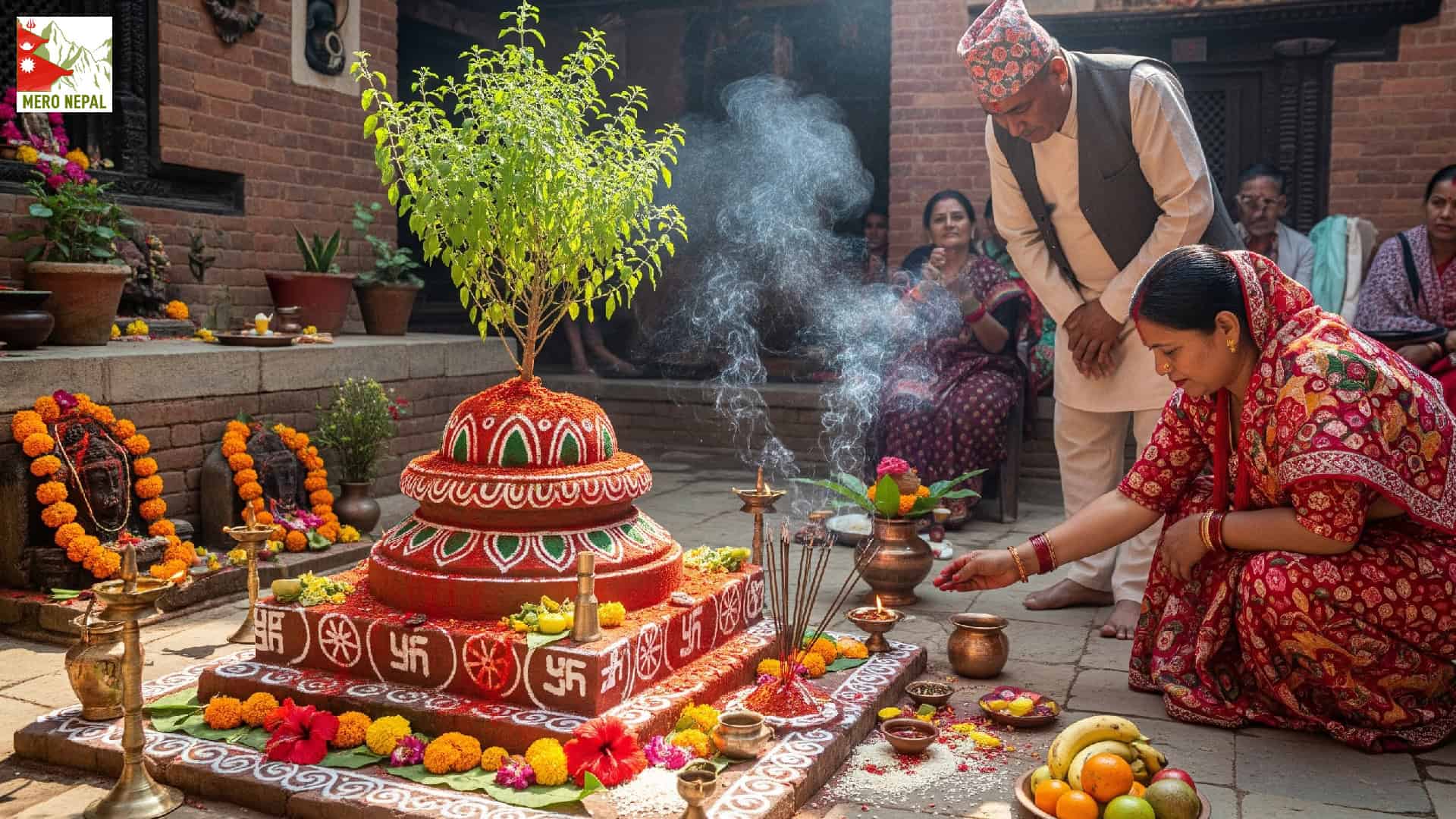Introduction
In Hindu tradition, the Tulsi plant (Holy Basil) holds immense religious, cultural, and medicinal value. It is regarded as the earthly manifestation of Goddess Lakshmi and a beloved plant of Lord Vishnu. Planting Tulsi at home is not only a sacred ritual but also believed to bring health, prosperity, and spiritual growth.
The ritual of planting Tulsi at home, especially during auspicious months, is celebrated as a blend of devotion, discipline, and tradition. Families across Nepal and India perform Tulsi ropan (plantation) with puja, prayers, and offerings to ensure blessings for the household.
Importance of Planting Tulsi
Planting Tulsi is not just an act of gardening—it is a spiritual ritual with deep symbolic meaning.
-
Religious Value: Tulsi is believed to purify the home and invite divine blessings.
-
Health Benefits: Tulsi leaves are widely used in Ayurveda for immunity, digestion, and stress relief.
-
Spiritual Upliftment: Daily worship of Tulsi strengthens devotion, reduces negativity, and enhances positivity in the home.
-
Family Prosperity: It is said that Tulsi ropan brings harmony, peace, and prosperity to the household.
When to Plant Tulsi
The best time for Tulsi plantation is during the auspicious Hindu months, especially in Ashadh (June–July) and Kartik (October–November). Tulsi Vivah, the ceremonial marriage of Tulsi and Lord Vishnu in Kartik, is also considered an ideal occasion.
-
Most Auspicious Days: Thursdays, Ekadashi, and Kartik Shukla Ekadashi (Tulsi Vivah).
-
Time of Day: Morning or evening during Brahma Muhurat or Shubh Muhurat.
Preparation for Tulsi Plantation
-
Select the Place: A clean, open, and holy space in the courtyard or balcony is ideal. Traditionally, Tulsi is planted in a Tulsi Math (a decorated clay pedestal).
-
Gather Puja Materials:
-
Tulsi sapling
-
Holy water (Ganga jal or pure water)
-
Incense, lamp, rice, vermilion (sindoor), sandalwood paste
-
Flowers, fruits, sweets, and betel leaves
-
-
Cleanliness: Take a bath or wash hands and feet before performing the ritual.
Step-by-Step Tulsi Plantation Ritual
-
Prepare the Tulsi Math or Pot: Clean it properly and decorate it with sindoor, rangoli, or sacred symbols like Om and Swastik.
-
Plant the Tulsi Sapling: Place the sapling in the soil inside the Tulsi Math or pot, covering its roots gently.
-
Watering and Purification: Sprinkle holy water on the sapling and around the plantation area.
-
Offerings and Puja: Light a lamp, burn incense, and offer flowers, rice, and sweets.
-
Mantra Chanting: Recite mantras such as:
“ॐ तुलस्यै नमः”
or Vishnu mantras to invoke blessings. -
Circumambulation (Parikrama): Family members walk around the Tulsi plant while praying for good health and prosperity.
Rules and Traditions to Follow
-
Water the Tulsi plant daily, except on Sundays and Ekadashi when it is traditionally avoided.
-
Do not pluck Tulsi leaves after sunset.
-
Offer Tulsi leaves to Lord Vishnu, Krishna, or Narayan during puja.
-
Keep the area around Tulsi clean and free from impurities.
Benefits of Tulsi Plantation
-
Spiritual Benefits: Increases devotion, brings peace of mind, and removes negativity.
-
Health Benefits: Acts as a natural immunity booster, cures common cold, and improves digestion.
-
Environmental Benefits: Purifies air and releases oxygen, making the surroundings healthier.
-
Family Prosperity: Brings harmony, fortune, and prosperity to the household.
Tulsi in Daily Life and Festivals
-
Tulsi Vivah: Symbolizes the divine marriage of Tulsi and Lord Vishnu, celebrated with grandeur.
-
Daily Puja: Lighting a lamp near Tulsi every evening is believed to invite Lakshmi, the goddess of wealth, into the home.
-
Seasonal Worship: During Kartik month, special prayers are dedicated to Tulsi with devotion and fasting.
Mero Nepal App – Your Digital Puja Guide
If you want to know the exact dates for Tulsi plantation, puja rituals, auspicious timings, and festival notifications, the Mero Nepal app makes it easy.
-
Get reminders for Tulsi Vivah, Ekadashi, Purnima, Amavasya, and other Hindu vrats.
-
Access daily Panchang, Nakshatra, and Muhurat.
-
Receive spiritual tips and updates at your fingertips.
👉 Download Mero Nepal App here
Conclusion
The Tulsi plantation ritual is more than just growing a plant—it is a sacred tradition that connects spirituality, health, and family prosperity. By planting Tulsi with devotion and following puja rituals, households invite peace, positivity, and divine blessings.
With the help of the Mero Nepal app, you can easily plan and perform your Tulsi ropan at the right time and in the right way, ensuring that no ritual or auspicious day is ever missed.





